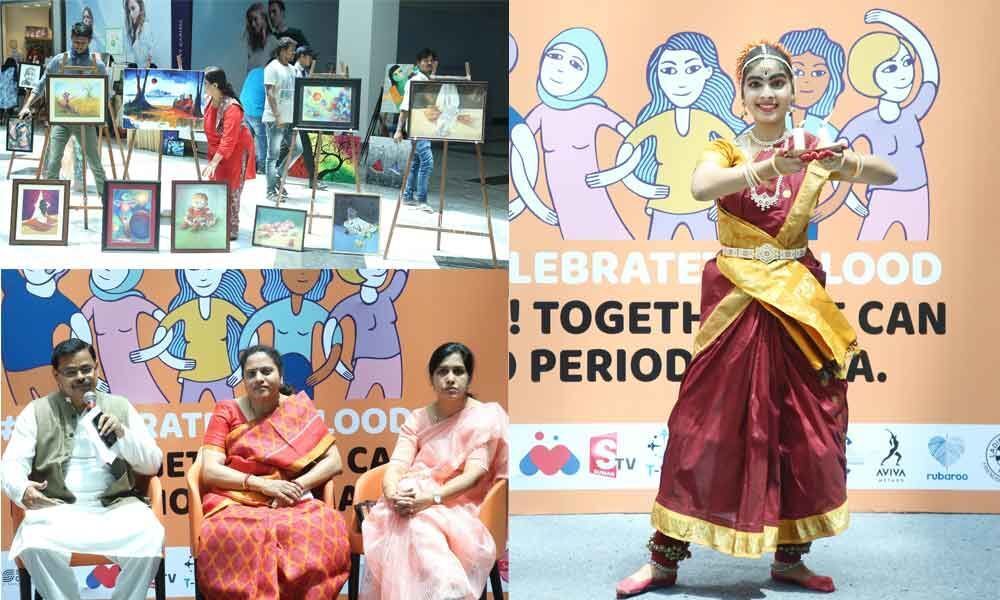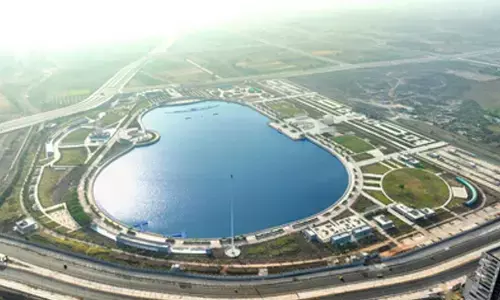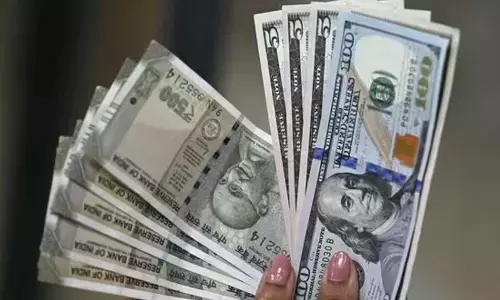Celebrate those five days

‘Good Universe’, a society of social workers organised 'Menstrual Festival' in Hyderabad to sensitise society and celebrate periods
The one day seminar, 'Menstrual Festival', with the theme 'Celebrate The Blood', was hosted on the eve of 'Menstrual Hygiene Day' (28 May), by 'Good Universe' - a society of social workers, professionals, health care specialists and young likeminded people, on Sunday at Sarath City Capital Mall, Hyderabad.
The festival was to celebrate periods and bring in a change in the society's mindset towards it.
As part of the Festival a seminar to engage different stakeholders involved in menstrual hygiene, in a conversation on menstruation, women's reproductive health and hygiene, was organised.
The festival was attended by Sudhakar Rao, director ICFAI; Dr Prabha Agrawal, Gynaecologist, and Kamalakanta Nayak, founder 'Good Universe'; Dr Anusha Pilli and Triparna Banerjee co-founders, Menstrual Festival; Arun Kumar, CEO, Elemantra Enterprises Pvt. Ltd; Sapna Karthik, vice chairperson HYLC; Mahalakshmi B, Hyderabad ambassador Eco Femme; Dr Mamatha; executive director Tharuni; and Anju Arora, co-founder The Period Hud; among others.
In the era of rational thinking and scientific developments, the taboo associated with menstruation, lack of knowledge on menstrual health and hygiene and the perpetual silence surrounding the associated risks on women's health and wellbeing, is perturbing.
It is extremely dismal to see that dialogue on menstruation, access of menstrual hygiene and women's sexual-reproductive health, is still hushed up and often swept under the carpet.
'The Menstrual Festival' is an initiative to bring all the stake holders on a platform and devise ways to break this silence and change the narrative of taboos around menstruation.
Arun Kumar said that menstrual waste disposal is the biggest challenge being faced by the society and it is becoming insurmountable and burgeoning problem by the day with more and more of it piling up.
Especially in the cities it is becoming a menace and can be a larger social issue in the days to come.
Dr Anusha Pilli shared, "A survey done by Good Universe with a sample of five hundred educated women, found that 92 per cent of them use commercial pads and the frequency of changing the pad is just about twice a day, which is really dangerous and harmful for their personal health.
Also, the menstrual waste is not being disposed properly. The survey also focussed on disposal of menstrual, it was found that the sanitary workers who collect waste from residences and dump yards, find the menstrual waste to be the most loathsome to pick-up and when they are left at the municipal dumps, the animals feed on them and contract infections, which in turn are passed on to human beings.
Also, the plastic lining in the commercial pads is indigestible for animals, proving to be fatal to them."
Sapna Karthik said, "Today there are lots of menstrual product alternatives available in the market, but reusable pads are recommended over others, though it has challenges like drying it, with little personal space in urban areas, with taboo associated in they are being dried in open space.
But reusable pads are very economical and easy on maintenance. As against rural women who have invented sustainable menstrual options and opt for them, the urban women have very limited options."
Dr Prabha Agrawal said, "Most girls don't have access to sex education and healthy habits; therefore, health education should be made compulsory as part of our school curriculum.
This is leading to we are adopting all unhygienic habits and causing various health problems in women.
To make pads more absorbable, plastic is being used rampantly, this can cause havoc to our body and environment. Plastic can disrupt hormonal and endocrinal balance and can cause infections, infertility and even cancers."
The seminar initiated a dialogue on menstruation and women's reproductive health with the objective of shattering the myths associated with menstruation.
Later an Art showcase with the theme of menstruation and women's health was hosted with live art, music, art exhibition and photography.















